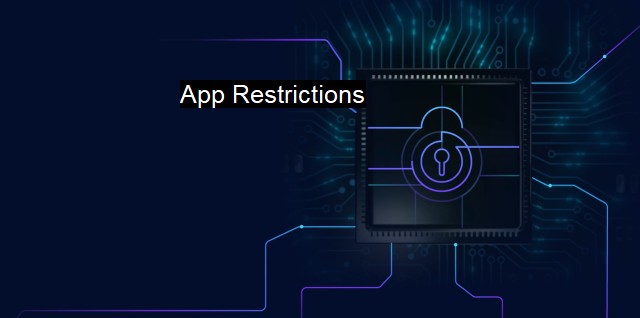What are App Restrictions?
Improving Mobile Device Cybersecurity with App Restrictions: Controlling Permissions and protecting against Malicious Code
"App restrictions" is a term used antivirus software, and digital information technology, referring to a set of regulations and rules which limit the permissions, access, operations and behaviors that an application can carry out on a device, like smartphones, laptops, or enterprise-grade servers.In more detailed terms, "app restrictions" constitute a subset of application management. They are predominantly meant to serve two main purposes. Firstly, these restrictions safeguard the user's information, privacy, and digital security by controlling what an application can mark its presence on inside a device. Secondly, they encourage secure application development, confining apps within certain boundaries, consequently facilitating a safer software ecosystem.
To give you an explicit example, ponder on how smartphone apps request access to your device’s services like camera, microphone, location data, text messages, contact lists, and other personal data. The technology backing this is mainly an effective implementation of app restrictions—derived from processes of gaining permissions and revoking them (in the case of user denial or potential misuse).
With app restrictions play an even more predominant role. Virus, malware, other intrusive software, or else rogue or badly coded applications continually seek to pose threats to your device and personal information. These threats would attempt to gain unwarranted access to your data and system or exploit the same for invasive purposes.
Without app restrictions in place, applications might be granted queue-less access to critical system resources, files, services, and even other apps. This could allow malicious applications to run a number of hazardous operations, such as unauthorized sending of personal data, alteration of system files, tracking of personal information, or unfettered usage that drains system and battery resources.
App restrictions often come into play through a multitude of methods. First among them are those which are in-built into the operating systems. Modern operating systems embedded with recognized app ecosystems enforce app restrictions right from the stage of application development. They control what an application has permissions to do within a device—these may range from interfacing with certain hardware to accessing certain classes of data.
Antivirus software also utilize app restrictions as a defensive method. By observing app behavior in the contexts of their granted permissions, these antivirus solutions can mark out potential threats and limit their operations. App restrictions can be installed by the antivirus to block or limit an application's operations which are fraudulent or suspicious.
For larger organizations, a much higher level of restrictions is employed. They use investment protocols to restrict apps from taking actions that could potentially sabotage sensitive data. Organizations may restrict applications from being installed on official devices, forbid them from accessing the internet or certain websites, and limit their permissions to compute operations punishable by laws.
The importance of app restrictions should not be understated. Responsible application of these regulations keeps users secure from multiple types of software-related threats. At the same time, an understanding of app restrictions helps to encourage a safer software ecosystem, where players adhere to a shared line of regulations, and thereby, contribute to a cottage-user environment for everyone.

App Restrictions FAQs
What are app restrictions in the context of cybersecurity and antivirus?
App restrictions refer to the limitations put in place by cybersecurity and antivirus software to restrict certain applications from running on a device. These restrictions are implemented to prevent malicious or vulnerable apps from accessing sensitive data or causing harm to the device.How do app restrictions help in protecting a device against cybersecurity threats?
App restrictions help in protecting a device against cybersecurity threats by limiting the access that apps have to sensitive data or device resources. By restricting the apps that can run on a device, the chances of a malicious or vulnerable app causing harm to the device or accessing sensitive data are significantly reduced.Can app restrictions be customized to suit the needs of individual users?
Yes, app restrictions can be customized to suit the needs of individual users. Cybersecurity and antivirus software typically provide users with the option to choose which apps they want to restrict from running on their device. Users can either select apps from a pre-defined list or manually add specific apps to the restricted list.Are app restrictions effective in preventing all types of cybersecurity threats?
While app restrictions are effective in preventing several types of cybersecurity threats, they may not be foolproof in preventing all types of threats. Sophisticated malware may bypass app restrictions or exploit vulnerabilities in apps that are allowed to run on a device. Therefore, it's important to use app restrictions in conjunction with other cybersecurity measures such as antivirus software, firewalls, and regular software updates to ensure maximum protection against cybersecurity threats.| | A | | | B | | | C | | | D | | | E | | | F | | | G | | | H | | | I | | | J | | | K | | | L | | | M | |
| | N | | | O | | | P | | | Q | | | R | | | S | | | T | | | U | | | V | | | W | | | X | | | Y | | | Z | |
| | 1 | | | 2 | | | 3 | | | 4 | | | 7 | | | 8 | | |||||||